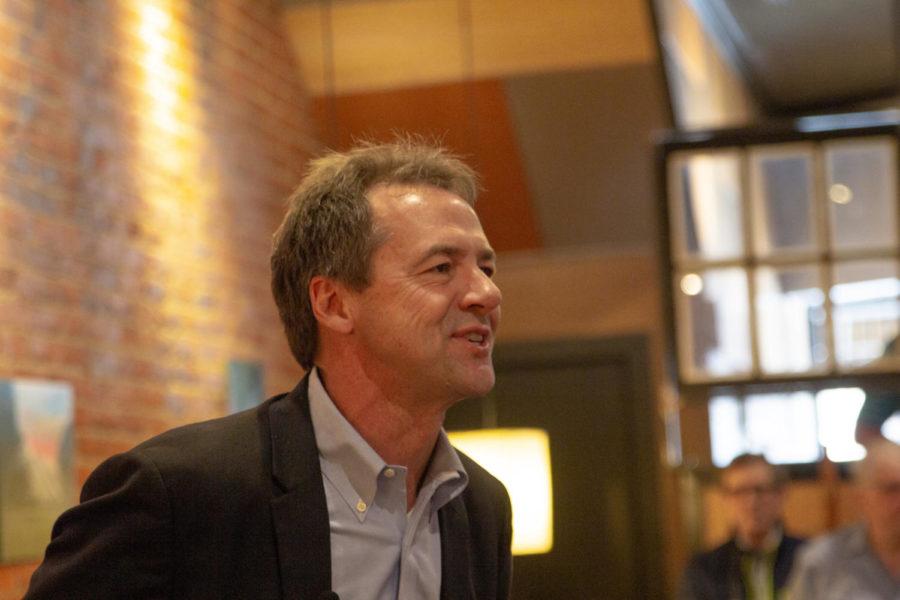Two moderate Democrats exit presidential race while others persist
Grant Tetmeyer/Iowa State Daily
Montana governor and then-Democratic presidential candidate Steve Bullock addresses a group of supporters at Cafe Diem on May 28. He addressed topics such as voting access and union and women’s rights.
December 2, 2019
Moderate Democratic presidential candidates have headed for the exits in recent days.
Retired Navy Admiral and former Rep. Joe Sestak announced his exit from the Democratic primary in a statement released late Sunday.
“I want to thank you for the honor of running for President of the United States of America,” Sestak said in a statement. “It has been an endeavor filled with immeasurable wisdom, passions, humor and insights to, and from, the people of America.”
Sestak was followed by Montana Gov. Steve Bullock early Monday.
“Today, I am suspending my campaign to become the Democratic Party’s nominee for president,” Bullock said in a press release. “While there were many obstacles we could not have anticipated when entering this race, it has become clear that in this moment, I won’t be able to break through to the top tier of this still-crowded field of candidates.”
Bullock had last qualified for the debate stage in the two-night Democratic presidential debates in July, sponsored by CNN. Sestak never qualified for any of the presidential debates.
In the November Selzer Iowa poll conducted for the Des Moines Register, CNN and Mediacom, Sestak and Bullock were the first or second choices of zero percent of likely Iowa Democratic caucusgoers.
Other moderate Democrats have persisted in their quest for the Democratic nomination, despite low polling numbers.
Former Rep. John Delaney, another moderate Democrat seeking the party’s presidential nomination, issued a press release claiming he “endures” in the presidential race “while other moderates drop out.”
Delaney has not been on the debate stage since July and polled at zero percent among likely Iowa Democratic caucusgoers in the Selzer survey.
Delaney’s campaign included a statement in the release from a former Register opinion columnist who endorsed him, Chuck Offenburger.
“I’ve watched John Delaney slowly and steadily build his campaign and his positions from conversations with tens of thousands of Iowans in all 99 counties over the past two years,” Offenburger said in the release. “The result of campaigning that way? John has the most solid, well-thought platform in the field. You need to read and consider it, if you haven’t already. His pragmatic, moderate positions are what will win for Democrats in 2020.”
Delaney’s poll numbers have steadily dropped from a high of 1.7 percent support among likely Iowa Democratic caucusgoers in the RealClearPolitics polling average in July to its current zero percent support, where he has languished since October. Over the course of his campaign, he has raised $2.7 million from supporters while self-funding a further $24.4 million as of Oct. 31, according to Federal Election Commission filings.
Delaney’s quixotic campaign is not the only example of low-polling moderates still in the race.
Former New York Mayor Michael Bloomberg, another moderate Democrat, entered the presidential race on Nov. 24.
He has since spent more than $30 million on his campaign, according to ad-buy tracker Advertising Analytics, while languishing in the low-single digits in the RealClearPolitics national polling average and likely Iowa Democratic caucusgoers’ polling average.

















